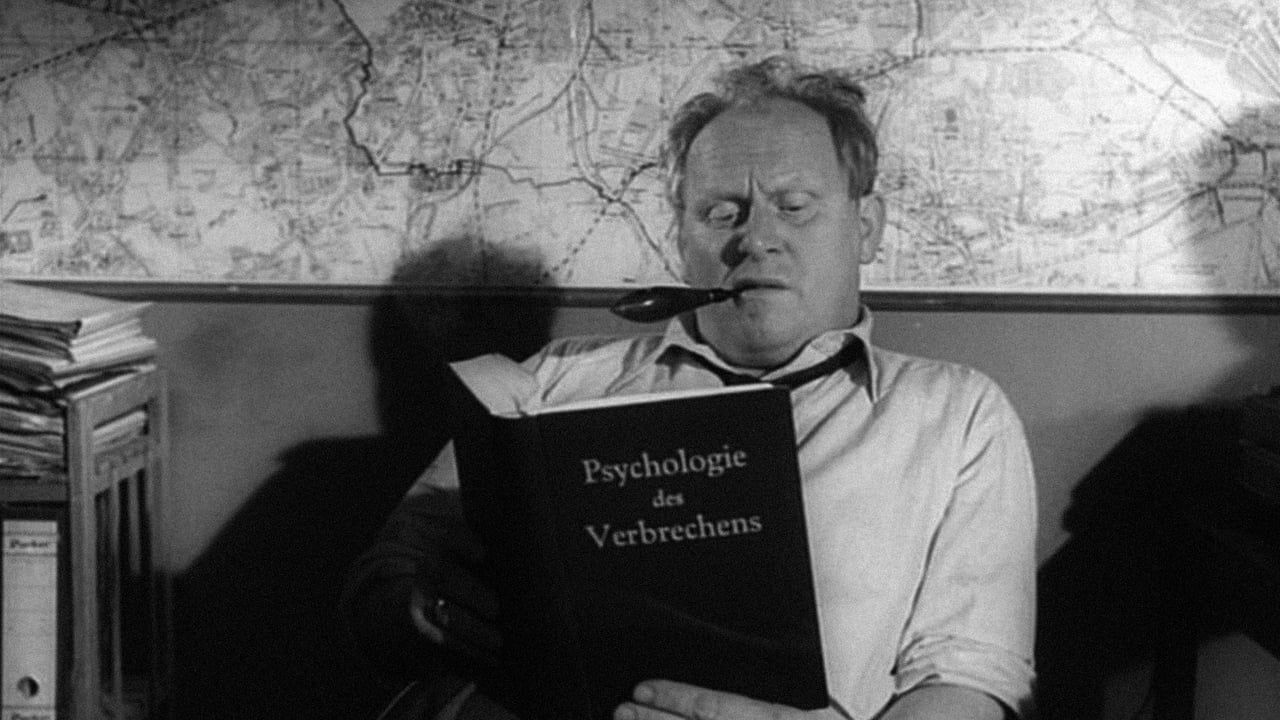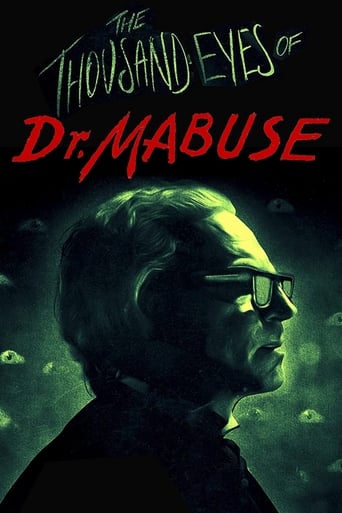

Well Deserved Praise
... View MoreAs somebody who had not heard any of this before, it became a curious phenomenon to sit and watch a film and slowly have the realities begin to click into place.
... View MoreThe movie's neither hopeful in contrived ways, nor hopeless in different contrived ways. Somehow it manages to be wonderful
... View MoreOne of the worst ways to make a cult movie is to set out to make a cult movie.
... View MoreFor nearly three decades, the visionary and brilliantly gifted writer/director Fritz Lang lived in the United States, because he fled from the Nazis and particularly from Joseph Goebbels who banned all of his previous films. But during the late fifties he returned to his home country Germany and completed the final three films of his rich career. Of course he couldn't retire without dedicating one last film to the character that is probably his most personally dearest and convoluted creation: Dr. Mabuse! The ingeniously and aptly titled "The 1000 Eyes of Dr. Mabuse" is in fact a belated but direct sequel to Lang's 1933 masterpiece "The Testament of Dr. Mabuse". It's a convoluted but extremely intelligent and hugely compelling mystery/crime thriller, with many characters and even more plot twists and secret story lines to discover. Some of the plot aspects are obvious and predictable, but most of the film is very surprising and incredibly fascinating! TV journalist Peter Barker dies in his car in the middle of an intersection, but what initially seems to be death by heart-attack turns out to be a case of vile murder committed by an ultra-advanced weapon that fires needles of steel into the victims' brains. Police Commissioner Kras was informed about the murder from beforehand, by the mysterious blind clairvoyant Peter Cornelius, and the modus operandi of the murder is very reminiscent to a murder committed nearly 30 years ago, by the henchmen of criminal mastermind Dr. Mabuse. The investigation of this crime, as well as several other peculiar and unsolved murders, leads to the Luxor Hotel. While commissioner Kras meets up with some interesting people at the bar, like an insurance agent and a hotel detective, we are introduced to two other guests, namely the beautiful young lady Marion who's about to commit suicide by jumping off the hotel's balcony, and the gentle and wealthy American industrialist Henry Travers who's courageous enough to save her. What connects all these individual people to the murder of journalist Peter Barker? And what's the link with Dr. Mabuse, who allegedly died in a mental asylum 30 years earlier? "The 1.000 Eyes of Dr. Mabuse" almost entirely revolves on suspenseful plotting and the intriguing rebirth of Lang's titular anti-hero protagonist. This film doesn't feature those beautiful expressionist trademarks anymore, like the case in the 1922 and 1933 films. That's okay, though, since the film was released in an entirely different era and focuses on more contemporary relevant things, like espionage and violent gimmicks such as exploding telephones and new kinds of artillery. However, one thing that Fritz Lang definitely kept alive in his post-WWII Dr. Mabuse movie is the criticism towards Germany's fascist past, ha! Apart from a terrific screenplay and a wondrously grim atmosphere, "The 1.000 Eyes of Dr. Mabuse" can also rely on a whole series of impeccable acting performances. Gert Fröbe, known as one of the best James Bond villains in "Goldfinger", is excellent as the skeptical police inspector in charge of the investigation. Other great performances come from Peter Van Eyck, Dawn Addams, Wolfgang Preiss and Werner Peters. Cult fanatics will also definitely recognize Jess Franco regular Howard "Dr. Orloff" Vernon in a delightful supportive role as merciless hit man. The reincarnation of Dr. Mabuse's character also meant the start of several more sixties' sequels, and I plan to watch them all one day. Great stuff, warmly recommended to fans of Fritz Lang, but also to admirers of good "Krimi" (crime) thrillers.
... View MoreFritz Lang is a talented director. He's the guy who made "Metropolis," a startling vision of the future before such visions were cool. And he made "M", which turned a monster into an object of pity. In America, after slipping out of Germany, he directed a couple of fascinating noirs.But you wouldn't know it from "Die 1000 Augen des Dr. Mabuse." Even the always-interesting presence of Peter Van Eyck, Hollywood's Ur-German, and the almost unrecognizable Wolfgang Preiss, can't save this from being a fairly typical B-movie with a plot more confusing than most.After an opening that might have come directly from a Charlie Chan movie -- a victim collapses in public, shot in the head with an almost undetectable sliver of metal -- we are taken to a garishly made-up Dawn Addams perched on the ledge of a tall building, about to jump for reasons we know not of.She's talked in by Van Eyck and there follow innumerable perplexing plot developments organized around a couple of themes that don't seem to have much to do with one another.Lang often made good use of mirrors and he does so here. And Gert Frobe turns in a good performance as a shambling, good-natured, pipe-smoking detective.The story, though, is full of incidents that may be suspenseful in themselves without helping the plot in an immediate way. It plods along like somebody with a club foot.It's a disappointing piece of work, slow and uninteresting. Fans of Fritz may get more out of it than I did.
... View MoreFritz Lang's final movie saw him return to one of his greatest creations, the enigmatic criminal master Dr. Mabuse. Much like the influence this villain has over people in the movies, so was the influence he had over Lang, who made three distinct Dr. Mabuse movies in three different periods of his life.In The 1000 Eyes of Dr. Mabuse we go to post-war Germany. Mysterious, ingenious crimes are succeeding one after another, so brilliant in technique that the police remember the crimes of Dr. Mabuse, just before Hitler took over.Meanwhile a rich American industrialist is in Germany to close a deal. At the Luxor Hotel he saves a woman from committing suicide. But this altruistic gesture plunges him into a world of deception, blackmail, voyeurism and international crime.Trying to get to the bottom of this is Commissioner Kras, with the help of a shifty insurance salesman and a blind psychic.Lang's movies have always been ahead of their time. His silent movies showed an amazing understanding of the language of cinema, and when sound came he incorporated it into the movie as a storytelling tool and not just an excuse for talking heads. In this movie we see the genesis of modern thrillers like the Bond franchise: secret criminal empires, shadowy villains, cars with intricate gadgets, the use of secret cameras to spy on people, unique weapons. But even after fifty years, here it still looks fresh and bold.Much like The Testament of Dr. Mabuse, this is one of the best thrillers I've ever seen. It's suspenseful, it's surprising, and it's intelligent. Kras is not the moronic policeman we see so often in cinema; he's clever, he's good at deducing things. And Dr. Mabuse is always one step ahead, always has contingency plans, knows everything. How distant he is from the barely-articulate villains of our times.Any film lover will do himself a favor by watching this neglected gem.
... View MoreThe 1,000 Eyes of Dr. Mabuse represents my first venture into the world of Dr. Mabuse. Pigeon-holing this movie into a single genre is difficult. It's one part traditional krimi, one part spy movie, and one part thriller. Combined, these elements create, at least for me, a one of a kind experience that I really can't compare with much of anything I've seen before. I refuse to give the normal plot synopsis. Any plot details or other information would ruin the many twists and surprises found in The 1,000 Eyes of Dr. Mabuse. Fortunately for me, I went into the movie completely blind, knowing very little of what to expect. I would suggest not even looking over the IMDb page as vital information is presented on Mabuse's identity. The acting is good from a cast that, even if I didn't know all of the names, I recognized from years of watching WWII movies. Actors like Gert Forbe, Werner Peters, and Peter van Eyck give sold performances. Fritz Lang's direction is as competent as ever. The 1,000 Eyes of Dr. Mabuse has style to burn. Considering the movie was made more than 45 years ago, it still feels remarkably fresh. The mystery of who Dr. Mabuse is and what his fiendish plan is all about are wonderfully compelling and really pull you into the movie. The jazzy score is impossible to get out of your mind and fits well within the film. In short, it's movie like this that keeps me excited about exploring "new" cinema. If all of my first time viewings could be this entertaining, I would be very happy indeed.If The 1,000 Eyes of Dr. Mabuse has one weakness, it's the slow pace of the second act. The pace grinds to a crawl as the police begin their investigation into the events taking place. While it's fairly interesting and Gert Forbe is a good enough actor, there's not enough action in this portion of the film when compared with what came before and what comes afterward. A little more pep in the middle third of the film would have made it a real winner with me. It's a minor issue I have with the film, but it's an issue nonetheless.As I wrote previously, The 1,000 Eyes of Dr. Mabuse is the first Mabuse movie I've seen. After my wonderful experience with the movie, it won't be the last.
... View More